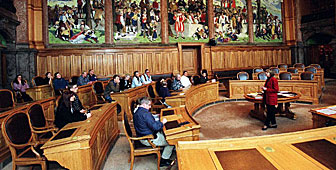Politics risks becoming preserve of elite

Fears that a parliamentary career is becoming the preserve of the rich have been heightened after the Senate refused to pay for parliamentary aides.
The Senate decision has prompted warnings that would-be parliamentarians without cash to spare will find it increasingly difficult to go into politics because MPs have to foot the bill personally if they want to employ a personal secretary or adviser.
Critics of the system argue that the need for support is crucial because members of Switzerland’s so-called “militia” parliament do not give up their jobs when they take on their mandate.
“No European parliament has a parliament without assistance,” says political scientist, Andreas Gross, who is also a Social Democrat MP.
He told swissinfo that the current system gives an unfair advantage to wealthy politicians because those without the means to recruit aides must do all the work themselves.
“I work 80 hours a week [because] I do everything myself. I do not earn as much as I should to afford an assistant,” says Gross.
Daunting workload
The workload facing parliamentarians is daunting, Gross adds, particularly under Switzerland’s system of direct democracy. Apart from general elections every four years, nationwide votes are held four times a year.
In addition, both houses of parliament usually meet four times a year for three-week sessions for public debates and to take political decisions. Members also usually take part in regular meetings of parliamentary committees throughout the year.
On average, a Swiss member of parliament receives about SFr80,000 ($51,000) a year. “This is not enough to live on,” says Heidi Z’graggen, a political researcher at Bern University, “especially if you take into account that this is a highly-qualified job”.
Skewed in favour of the rich
She agrees that the downside of the system is that it is potentially easier for well-off people to make a career in politics. This in turn means that some sections of society – notably poorer people and minorities – are under-represented.
Z’graggen points out, though, that the current system does have advantages. It allows semi-professional politicians to continue working in a non-political field, giving them an opportunity to acquire specific knowledge which may be useful in understanding issues confronting politicians.
It also makes it easier for politicians to go back to their jobs fulltime, if their political career is interrupted or if they chose to retire from politics altogether, Z’graggen says.
Independence
Ulrich Schlüer, a member of the right-wing Swiss People’s Party, is a firm believer in the current system. “It forces every member to be very effective in his political job and to concentrate on important issues.”
Schlüer, who works an editor of a political publication, says the Swiss system encourages politicians to find solutions individually and makes them more independent, for instance, in case they fail to be re-elected.
He says Swiss politicians are also more likely to keep “in touch” with ordinary citizens and to know what their concerns are.
Days are numbered
In Andreas Gross’s view, though, the militia system’s days are numbered. He says steps towards a more professional parliament are inevitable, because otherwise only privileged citizens will be willing and able to go into politics.
And parliament should be a true image of the whole society, including those citizens who are not well off, Gross argues. He expects that the Senate will eventually agree to fund aides for MPs – the House of Representatives has already come out in favour.
But the People’s Party has also pledged to challenge any increase in remuneration for parliament in a nationwide referendum. In 1992 voters rejected a similar proposal at the ballot box.
by Jonathan Summerton and Urs Geiser

In compliance with the JTI standards
More: SWI swissinfo.ch certified by the Journalism Trust Initiative










You can find an overview of ongoing debates with our journalists here . Please join us!
If you want to start a conversation about a topic raised in this article or want to report factual errors, email us at english@swissinfo.ch.